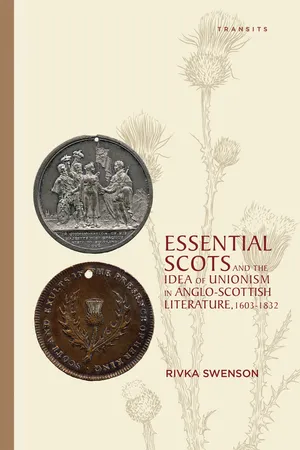
eBook - PDF
Essential Scots and the Idea of Unionism in Anglo-Scottish Literature, 1603–1832
- 349 pages
- English
- PDF
- Available on iOS & Android
eBook - PDF
Essential Scots and the Idea of Unionism in Anglo-Scottish Literature, 1603–1832
About this book
John Locke asked, "since all things that exist are merely particulars, how come we by general terms?" Essential Scots and the Idea of Unionism in Anglo-Scottish Literature, 1603–1832 tells a story about aesthetics and politics that looks back to the 1603 Union of Crowns and James VI/I's emigration from Edinburgh to London. Considering the emergence of British unionism alongside the literary rise of both description and "the individual," Rivka Swenson builds on extant scholarship with original close readings that illuminate the inheritances of 1603, a date of considerable but untraced importance in Anglo-Scottish literary and cultural history whose legacies are still being negotiated today. The 1603 Union of Crowns spurred interest in exploring the aesthetic politics of unionism in relation to an alleged Scottish essence that could be manipulated to resist or support "Britishness," even as the king's emigration generated a legacy of gendered representations of traveling Scots and "Scotlands-left-behind."
Discussing writers such as Bacon, Defoe, Smollett, Johnson, Macpherson, Ferrier, and Scott along with lesser-known or forgotten popular authors (and ballads, transparencies, newspapers, joke books, cant dictionaries, political speeches, histories, travel narratives, engravings, material artifacts such as medals and snuffboxes), Essential Scots describes the years 1603 to 1832 as a crucial period in British history. Paradoxically, the political and cultural exploration of ideas about "unionism" in relation to a supposed "essential Scottishness" participated in the increasing prominence of both description and the "individual" in nineteenth-century Scottish literature; Swenson persuasively concludes that essential Scottishness (as both "identity" and symbolism) was refigured to mediate a national synthesis between the emergent individual and the nascent British nation—as well as the naturalized, even de-politicized, literary synthesis of particulars within putatively analogous narrative wholes.
Discussing writers such as Bacon, Defoe, Smollett, Johnson, Macpherson, Ferrier, and Scott along with lesser-known or forgotten popular authors (and ballads, transparencies, newspapers, joke books, cant dictionaries, political speeches, histories, travel narratives, engravings, material artifacts such as medals and snuffboxes), Essential Scots describes the years 1603 to 1832 as a crucial period in British history. Paradoxically, the political and cultural exploration of ideas about "unionism" in relation to a supposed "essential Scottishness" participated in the increasing prominence of both description and the "individual" in nineteenth-century Scottish literature; Swenson persuasively concludes that essential Scottishness (as both "identity" and symbolism) was refigured to mediate a national synthesis between the emergent individual and the nascent British nation—as well as the naturalized, even de-politicized, literary synthesis of particulars within putatively analogous narrative wholes.
Frequently asked questions
Yes, you can cancel anytime from the Subscription tab in your account settings on the Perlego website. Your subscription will stay active until the end of your current billing period. Learn how to cancel your subscription.
No, books cannot be downloaded as external files, such as PDFs, for use outside of Perlego. However, you can download books within the Perlego app for offline reading on mobile or tablet. Learn more here.
Perlego offers two plans: Essential and Complete
- Essential is ideal for learners and professionals who enjoy exploring a wide range of subjects. Access the Essential Library with 800,000+ trusted titles and best-sellers across business, personal growth, and the humanities. Includes unlimited reading time and Standard Read Aloud voice.
- Complete: Perfect for advanced learners and researchers needing full, unrestricted access. Unlock 1.4M+ books across hundreds of subjects, including academic and specialized titles. The Complete Plan also includes advanced features like Premium Read Aloud and Research Assistant.
We are an online textbook subscription service, where you can get access to an entire online library for less than the price of a single book per month. With over 1 million books across 1000+ topics, we’ve got you covered! Learn more here.
Look out for the read-aloud symbol on your next book to see if you can listen to it. The read-aloud tool reads text aloud for you, highlighting the text as it is being read. You can pause it, speed it up and slow it down. Learn more here.
Yes! You can use the Perlego app on both iOS or Android devices to read anytime, anywhere — even offline. Perfect for commutes or when you’re on the go.
Please note we cannot support devices running on iOS 13 and Android 7 or earlier. Learn more about using the app.
Please note we cannot support devices running on iOS 13 and Android 7 or earlier. Learn more about using the app.
Yes, you can access Essential Scots and the Idea of Unionism in Anglo-Scottish Literature, 1603–1832 by Rivka Swenson in PDF and/or ePUB format, as well as other popular books in Literature & British History. We have over one million books available in our catalogue for you to explore.
Information
Table of contents
- CONTENTS
- ILLUSTRATIONS
- ACKNOWLEDGMENTS
- ABBREVIATIONS
- INTRODUCTION
- Part I. ESSENTIAL SCOTTISHNESS AND THE FORM OF ORIGINAL ANGLO-SCOTTISH DISCONTENT
- CHAPTER 1. WRITING ANGLO-SCOTTISH UNIONISM AND ITS DISCONTENTS IN 1603 AND 1707: Francis Bacon, Daniel Defoe, and English Anxieties of Narration
- CHAPTER 2. WRITING REUNION, REWRITING UNION FOR THE ATOMIC SCOT: Tobias Smollett’s Traveling Types after the ’45 and Seven Years War
- CHAPTER 3. WRITING REVOLUTION AS ESSENTIAL RECOVERY: Samuel Johnson’s Return to Scotland after Ossian
- Part II. UNIONISM AND THE CHALLENGE OF THE INDIVIDUAL IN EARLY NINETEENTH-CENTURY SCOTTISH WRITING
- CHAPTER 4. INDIVIDUAL CONCERNS, THE MOCK-GOTHIC, AND MARRIAGE TROUBLE: Anglo-Scottish Self-Difference in Susan Ferrier’s Laboratory
- CHAPTER 5. DESCRIBING THE SUBNATIONAL HINGE IN 1822: Robert Mudie and the Aesthetic Politics of the Synthetic British Text
- CODA. WALTER SCOTT AND THE LEGACY OF CHOSEN SCOTTISHNESS
- NOTES
- BIBLIOGRAPHY
- INDEX
- ABOUT THE AUTHOR